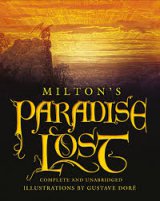Paradise Lost Page #20
Paradise Lost is an epic poem in blank verse by the 17th-century English poet John Milton. The first version, published in 1667, consisted of ten books with over ten thousand lines of verse. A second edition followed in 1674, arranged into twelve books with minor revisions throughout and a note on the versification.
So spake our general Mother, and with eyes Of conjugal attraction unreprov’d, And meek surrender, half imbracing leand On our first Father, half her swelling Breast Naked met his under the flowing Gold Of her loose tresses hid: he in delight Both of her Beauty and submissive Charms Smil’d with superior Love, as Jupiter On Juno smiles, when he impregns the Clouds That shed May Flowers; and press’d her Matron lip With kisses pure: aside the Devil turnd For envie, yet with jealous leer maligne Ey’d them askance, and to himself thus plaind. Sight hateful, sight tormenting! thus these two Imparadis’t in one anothers arms The happier Eden, shall enjoy thir fill Of bliss on bliss, while I to Hell am thrust, Where neither joy nor love, but fierce desire, Among our other torments not the least, Still unfulfill’d with pain of longing pines; Yet let me not forget what I have gain’d From thir own mouths; all is not theirs it seems: One fatal Tree there stands of Knowledge call’d, Forbidden them to taste: Knowledge forbidd’n? Suspicious, reasonless. Why should thir Lord Envie them that? can it be sin to know, Can it be death? and do they onely stand By Ignorance, is that thir happie state, The proof of thir obedience and thir faith? O fair foundation laid whereon to build Thir ruine! Hence I will excite thir minds With more desire to know, and to reject Envious commands, invented with designe To keep them low whom knowledge might exalt Equal with Gods; aspiring to be such, They taste and die: what likelier can ensue? But first with narrow search I must walk round This Garden, and no corner leave unspi’d; A chance but chance may lead where I may meet Some wandring Spirit of Heav’n, by Fountain side, Or in thick shade retir’d, from him to draw What further would be learnt. Live while ye may, Yet happie pair; enjoy, till I return, Short pleasures, for long woes are to succeed. So saying, his proud step he scornful turn’d, But with sly circumspection, and began Through wood, through waste, o’re hil, o’re dale his roam. Mean while in utmost Longitude, where Heav’n With Earth and Ocean meets, the setting Sun Slowly descended, and with right aspect Against the eastern Gate of Paradise Leveld his eevning Rayes: it was a Rock Of Alablaster, pil’d up to the Clouds, Conspicuous farr, winding with one ascent Accessible from Earth, one entrance high; The rest was craggie cliff, that overhung Still as it rose, impossible to climbe. Betwixt these rockie Pillars Gabriel sat Chief of th’ Angelic Guards, awaiting night; About him exercis’d Heroic Games Th’ unarmed Youth of Heav’n, but nigh at hand Celestial Armourie, Shields, Helmes, and Speares Hung high with Diamond flaming, and with Gold. Thither came Uriel, gliding through the Eeven On a Sun beam, swift as a shooting Starr In Autumn thwarts the night, when vapors fir’d Impress the Air, and shews the Mariner From what point of his Compass to beware Impetuous winds: he thus began in haste. Gabriel, to thee thy cours by Lot hath giv’n Charge and strict watch that to this happie place No evil thing approach or enter in; This day at highth of Noon came to my Spheare A Spirit, zealous, as he seem’d, to know More of th’ Almighties works, and chiefly Man Gods latest Image: I describ’d his way Bent all on speed, and markt his Aerie Gate; But in the Mount that lies from Eden North, Where he first lighted, soon discernd his looks Alien from Heav’n, with passions foul obscur’d: Mine eye pursu’d him still, but under shade Lost sight of him; one of the banisht crew I fear, hath ventur’d from the deep, to raise New troubles; him thy care must be to find. To whom the winged Warriour thus returnd: Uriel, no wonder if thy perfet sight, Amid the Suns bright circle where thou sitst, See farr and wide: in at this Gate none pass The vigilance here plac’t, but such as come Well known from Heav’n; and since Meridian hour No Creature thence: if Spirit of other sort, So minded, have oreleapt these earthie bounds On purpose, hard thou knowst it to exclude Spiritual substance with corporeal barr. But if within the circuit of these walks In whatsoever shape he lurk, of whom Thou telst, by morrow dawning I shall know. So promis’d hee, and Uriel to his charge Returnd on that bright beam, whose point now raisd Bore him slope downward to the Sun now fall’n Beneath th’ Azores; whither the prime Orb, Incredible how swift, had thither rowl’d Diurnal, or this less volubil Earth By shorter flight to th’ East, had left him there Arraying with reflected Purple and Gold The Clouds that on his Western Throne attend: Now came still Eevning on, and Twilight gray Had in her sober Liverie all things clad; Silence accompanied, for Beast and Bird, They to thir grassie Couch, these to thir Nests Were slunk, all but the wakeful Nightingale; She all night long her amorous descant sung; Silence was pleas’d: now glow’d the Firmament With living Saphirs: Hesperus that led The starrie Host, rode brightest, till the Moon Rising in clouded Majestie, at length Apparent Queen unvaild her peerless light, And o’re the dark her Silver Mantle threw. When Adam thus to Eve: Fair Consort, th’ hour Of night, and all things now retir’d to rest Mind us of like repose, since God hath set Labour and rest, as day and night to men Successive, and the timely dew of sleep Now falling with soft slumbrous weight inclines Our eye-lids; other Creatures all day long Rove idle unimploid, and less need rest; Man hath his daily work of body or mind Appointed, which declares his Dignitie, And the regard of Heav’n on all his waies; While other Animals unactive range, And of thir doings God takes no account. Tomorrow ere fresh Morning streak the East With first approach of light, we must be ris’n, And at our pleasant labour, to reform Yon flourie Arbors, yonder Allies green, Our walks at noon, with branches overgrown, That mock our scant manuring, and require More hands then ours to lop thir wanton growth: Those Blossoms also, and those dropping Gumms, That lie bestrowne unsightly and unsmooth, Ask riddance, if we mean to tread with ease; Mean while, as Nature wills, Night bids us rest. To whom thus Eve with perfet beauty adornd. My Author and Disposer, what thou bidst Unargu’d I obey; so God ordains, God is thy Law, thou mine: to know no more Is womans happiest knowledge and her praise. With thee conversing I forget all time, All seasons and thir change, all please alike. Sweet is the breath of morn, her rising sweet, With charm of earliest Birds; pleasant the Sun When first on this delightful Land he spreads His orient Beams, on herb, tree, fruit, and flour, Glistring with dew; fragrant the fertil earth After soft showers; and sweet the coming on Of grateful Eevning milde, then silent Night With this her solemn Bird and this fair Moon, And these the Gemms of Heav’n, her starrie train: But neither breath of Morn when she ascends With charm of earliest Birds, nor rising Sun On this delightful land, nor herb, fruit, floure, Glistring with dew, nor fragrance after showers, Nor grateful Evening mild, nor silent Night With this her solemn Bird, nor walk by Moon, Or glittering Starr-light without thee is sweet. But wherfore all night long shine these, for whom This glorious sight, when sleep hath shut all eyes?
Translation
Translate and read this book in other languages:
Select another language:
- - Select -
- 简体中文 (Chinese - Simplified)
- 繁體中文 (Chinese - Traditional)
- Español (Spanish)
- Esperanto (Esperanto)
- 日本語 (Japanese)
- Português (Portuguese)
- Deutsch (German)
- العربية (Arabic)
- Français (French)
- Русский (Russian)
- ಕನ್ನಡ (Kannada)
- 한국어 (Korean)
- עברית (Hebrew)
- Gaeilge (Irish)
- Українська (Ukrainian)
- اردو (Urdu)
- Magyar (Hungarian)
- मानक हिन्दी (Hindi)
- Indonesia (Indonesian)
- Italiano (Italian)
- தமிழ் (Tamil)
- Türkçe (Turkish)
- తెలుగు (Telugu)
- ภาษาไทย (Thai)
- Tiếng Việt (Vietnamese)
- Čeština (Czech)
- Polski (Polish)
- Bahasa Indonesia (Indonesian)
- Românește (Romanian)
- Nederlands (Dutch)
- Ελληνικά (Greek)
- Latinum (Latin)
- Svenska (Swedish)
- Dansk (Danish)
- Suomi (Finnish)
- فارسی (Persian)
- ייִדיש (Yiddish)
- հայերեն (Armenian)
- Norsk (Norwegian)
- English (English)
Citation
Use the citation below to add this book to your bibliography:
Style:MLAChicagoAPA
"Paradise Lost Books." Literature.com. STANDS4 LLC, 2024. Web. 24 Nov. 2024. <https://www.literature.com/book/paradise_lost_101>.




Discuss this Paradise Lost book with the community:
Report Comment
We're doing our best to make sure our content is useful, accurate and safe.
If by any chance you spot an inappropriate comment while navigating through our website please use this form to let us know, and we'll take care of it shortly.
Attachment
You need to be logged in to favorite.
Log In